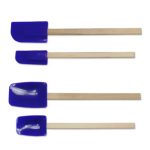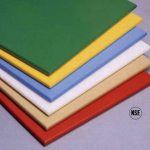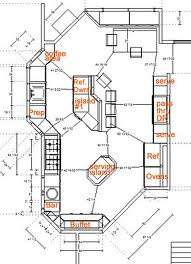 This blog is all about learning the basic things your kitchen needs so anyone can cook a basic meal and feed themselves. We’ve also discussed the need to be careful about what kitchen appliances you spend money on to avoid acquiring dust collectors. We’re talking about what we call the “intermediate” level of kitchen equipment — things that are useful but not absolutely necessary.
This blog is all about learning the basic things your kitchen needs so anyone can cook a basic meal and feed themselves. We’ve also discussed the need to be careful about what kitchen appliances you spend money on to avoid acquiring dust collectors. We’re talking about what we call the “intermediate” level of kitchen equipment — things that are useful but not absolutely necessary.
One of the things we’ve noticed in cooking is that often we need the same equipment for more than one job when making a meal. For example, we might need the wire strainer to wash the rice, but also to drain the grease off cooked ground meat. Or our Pyrex measuring cup is used to measure milk to go into a dish, but we also need it to mix up a marinade.
 That means for a well-equipped kitchen, you don’t always need more things, but more of the same things. This includes measuring cups, both wet and dry, measuring spoons, spatulas, whisks of varying sizes, mixing bowls and anything else you use a lot.
That means for a well-equipped kitchen, you don’t always need more things, but more of the same things. This includes measuring cups, both wet and dry, measuring spoons, spatulas, whisks of varying sizes, mixing bowls and anything else you use a lot.
 Cutting boards are a kitchen basic. You need at least one good one that will preserve your knives and is easy to clean. But we also recommend you have more than one. In fact, three or four are best, color-coded if possible. Many chefs and cooks insist on at least two, a wooden one for fruits and vegetables, and an acrylic one for meat and fish. But having several of those flexible ones can be useful for conveying ingredients and other jobs you might not have considered for a cutting board.
Cutting boards are a kitchen basic. You need at least one good one that will preserve your knives and is easy to clean. But we also recommend you have more than one. In fact, three or four are best, color-coded if possible. Many chefs and cooks insist on at least two, a wooden one for fruits and vegetables, and an acrylic one for meat and fish. But having several of those flexible ones can be useful for conveying ingredients and other jobs you might not have considered for a cutting board.
Space is always in short supply in The Bachelor’s Kitchen. But organization is key to keeping your kitchen running smoothly and not wasting time trying to find the right pan for the job. If you say you don’t have time to cook, how can you have time to find the vegetable peeler? Most of us have a drawer for the utensils. But do you have a special place for your mixing bowls? How about plates and glassware? Try to  organize your kitchen the way professionals do — in stations. We know space is at a premium, but if you arrange things according to usage, it will make pulling together a meal much easier. Put condiments (that don’t need refrigeration), salt, pepper grinder, herbs and spices you use often within arm’s reach, while others go into the cabinet or on a shelf. In other words, arrange things like you would if you were lining up your ingredients for cooking. Have pinch bowls, ramekins or other small containers for ingredients within easy reach.
organize your kitchen the way professionals do — in stations. We know space is at a premium, but if you arrange things according to usage, it will make pulling together a meal much easier. Put condiments (that don’t need refrigeration), salt, pepper grinder, herbs and spices you use often within arm’s reach, while others go into the cabinet or on a shelf. In other words, arrange things like you would if you were lining up your ingredients for cooking. Have pinch bowls, ramekins or other small containers for ingredients within easy reach.
Organize your pantry. We know stuff just gets shoved into any old empty space in your cabinets. Some of you might even be surprised as to what’s hiding from you in the dark recesses of your stores. And a lot of the packaging that comes with staple items just takes up space.  Invest in some clear containers that can be stacked in needed. And don’t limit your choices to flour, sugar and tea bags. Use them to hold pasta, beans, rice, cereals, nuts and dried fruits. Just make sure you buy ones with air-tight seals. They should be of varying sizes and shapes, easy to open and have wide openings for scooping or pouring. Too poor to buy a good set of canisters? No problem. Buy food in big jars and then clean and use them. In The Bachelor’s Kitchen, we like fruit and pickle jars as well as purchased canisters. We use them for all sorts of jobs, like making homemade dressing, storing leftover tomato paste and shaking up our own spice blends.
Invest in some clear containers that can be stacked in needed. And don’t limit your choices to flour, sugar and tea bags. Use them to hold pasta, beans, rice, cereals, nuts and dried fruits. Just make sure you buy ones with air-tight seals. They should be of varying sizes and shapes, easy to open and have wide openings for scooping or pouring. Too poor to buy a good set of canisters? No problem. Buy food in big jars and then clean and use them. In The Bachelor’s Kitchen, we like fruit and pickle jars as well as purchased canisters. We use them for all sorts of jobs, like making homemade dressing, storing leftover tomato paste and shaking up our own spice blends.
As with all tools, you should buy the best you can afford. But don’t just look at the price. Many kitchenware products have a great label but don’t perform as we think they should. So take a moment on the Internet to look at unbiased product reviews. We like to hit Consumer Reports first, but often commercial sites like Amazon have good reviews. Take into consideration how you will use those items and, most importantly, where you’ll put them when not using them. Don’t spend a lot of money on cookware you will only use once a year. Instead of buying a turkey roasting pan, get the cheaper aluminum foil version and save storage space and clean up time. While you’re looking at reviews, don’t just read the good ones. Sometimes the bad ones can be quite revealing.
Clear the clutter. If you have kitchen items, even small ones like measuring spoons, that you no longer need or don’t use, donate them to someone who could use them. Don’t know anyone in that category, local thrift shops will probably be glad to have your clean and gently used goods.
Caution: Kitchenware can be addicting! It’s so easy to get carried away when you’re buying things for the kitchen. That leads to lost money, crowded counters and dust collectors. Before you buy any equipment for your kitchen, ask yourself if you really need it or do you just want it. Have you had several instances where you could have used this? Or are you just full of good intentions to use it? Good intentions are not enough. You don’t have a current need for something that you regularly do, then you probably don’t need it.
Ultimately, what every kitchen needs is people to enjoy it. Even if you’re a loner, food is best when shared. Take a chance on offering something you’ve cooked to a neighbor or co-workers. You’ll find whatever you make will taste a lot better.